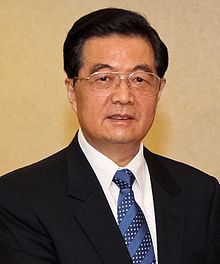- President of the People's Republic of China
-
President of the
People's Republic of China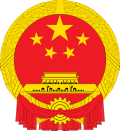
Emblem of the People's Republic of ChinaResidence Zhongnanhai Nominator the presidium of the National People's Congress Appointer the National People's Congress Term length Five Years, renewable
once consecutivelyInaugural holder Mao Zedong (1954)
Li Xiannian (1983)Formation 1954-1975
December, 1982Website Presidency The President of the People's Republic of China (simplified Chinese: 中华人民共和国主席; traditional Chinese: 中華人民共和國主席; pinyin: Zhōnghuá Rénmín Gònghéguó Zhǔxí, formerly called Chairman of the People's Republic of China from 1954 to 1975, or Guójiā Zhǔxí 国家主席, literally State Chairman) is a ceremonial office and a part of State organs under the National People's Congress (NPC) and it is the head of state of the People's Republic of China (PRC). The office was created by the 1982 Constitution. Formally, the President is elected by the National People's Congress in accordance with Article 62 of the Constitution.
The PRC President is a state organ instead of an administrative post. Also it is an important national symbol serving as the nominal head of state. Currently, President Hu Jintao holds the position of General Secretary of the Communist Party of China, making him China's Paramount Leader.
The term Zhuxi refers to the chairman in a committee, and was translated as such prior to the 1982 constitution (as in Chairman Mao Zedong, although Mao's title refers primarily to the position of Party Chairman which he held from 1943 until his death in 1976). The official translation switched to President after 1982 in conformity with Western terminology. However, Zhuxi stayed in Chinese, and in other contexts still corresponds to chairman in English. Meanwhile, the translation of English term President as the head of other states remained Zongtong (simplified Chinese: 总统; traditional Chinese: 總統; pinyin: zǒngtǒng), causing a bit of confusion with regard to usage.[who?]
Contents
Selection, succession, and requirements
People's Republic of China 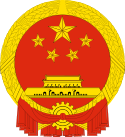
This article is part of the series:
Politics and government of
the People's Republic of ChinaIdeology- Leadership of China
- Constitutional history
- National People's Congress
- NPC Standing Committee
- President: Hu Jintao
- State Council (Central People's Government)
- Premier: Wen Jiabao
- Vice Premiers
- 1st ranking: Li Keqiang
- State Councilors
- Vice Premiers
- Premier: Wen Jiabao
- PRC Central Military Commission
- Supreme People's Court
- President: Wang Shengjun
- Supreme People's Procuratorate
- Procurator-General: Han Zhubin
- Political Consultative Conference
- National Committee
- Minor political parties
Other issues
According to the Constitution of the People's Republic of China since 1982, the National People's Congress (NPC), in theory China's top law-making body, has the power to elect and force the resignation of the President. By law, the President must be a Chinese citizen of 45 years of age or older. The President cannot serve for over two successive terms, a term being the equivalent of one session of the NPC, which is five years. Also, all the authorities and works of the President must be done under the NPC and its Standing Committee's order. The President does not have any administrative power; the position is that of a powerless figurehead.[1]
The President promulgates statutes adopted by the NPC and NPCSC. The functions of the President are largely ceremonial; the President appoints the Premier upon the NPC's decision, Vice-Premiers, State Council members and Ministers of all departments upon the nomination of the Premier, all ambassadors to foreign countries, and all legislative committee chairs, treasurers and secretaries. The President has the responsibility to give Special Presidential Decrees, and declare states of emergency, and declare war ritually upon the NPC's decision without any own power. The President is assisted by the Vice-President.
In the event that the President dies or leaves office, the Vice-President automatically assumes presidential powers. In the event that they both are unable to perform normal duties, the Chairman of the National People's Congress will perform the duties of the President as Acting President until the NPC can elect a new one.
Relation to the state
As the President is legally China's head of state, he is responsible for China's image. Since 1993, the President has also been the General Secretary of CPC who is generally responsible for establishing general policy and direction of the state and leaves responsibility for the implementation details to the Premier of the People's Republic of China, the head of government.
Relation with the Party
Although the presidency of China is a symbolic position only, since the 1990s, it has been general practice for the President to also serve as the General Secretary of the Communist Party of China.
It is key for the general secretary to seal his diplomatic power by adding the presidency to his powerful collection of titles. This effectively shows the Communist leader's national representation.
Relation with the military
The relationship between the President and the military is more difficult to discern. The potential for conflict is lessened when, as during the Jiang era, the President is also Chairman of the Central Military Commission. However, there is a source of potential conflict when this is not the case, shown by the situation in 2003 when top Communist leader Hu Jintao was elected President without being elected the CMC Chair. In addition, most of the members of both the Party and the State Central Military Commission are uniformed senior generals, giving the People's Liberation Army a degree of autonomy. This autonomy, however, is limited by the existence of political officer.
In principle, when the President is also party general secretary, he could order the Party Central Military Commission to order the state Central Military Commission to do something,[citation needed] however how this would work in a crisis is unclear.
There have been proposals to constitutionally change the system of command to form a National Security Council, modelled after the National Security Council of the United States, which would give the President undisputed command of the military which would then be just another ministry. These proposals were not actively discussed because of opposition from senior generals. In September 2004, Jiang stepped down as Chairman of the commission, and President Hu Jintao became the Commander-in-Chief of the People's Liberation Army.
History
After the implementation of the Constitution of People's Republic of China in 1954, Mao Zedong, who had served as the Chairman of the Central People's Government since 1949, was selected Chairman of the People's Republic of China. Mao, who was also Chairman of the Communist Party of China and Chairman of the Central Military Commission, was clearly the most powerful person in China. In the Constitution of 1954, the President (officially translated as "Chairman") of the PRC was intended to be quite powerful, serving both as the Head of State, and the nominal Commander-in-Chief of the armed forces. The president had special powers to call upon emergency meetings during a crisis or concerns of national security.
After his failures in the Great Leap Forward, Mao decided to give up the State presidency in 1959. He was succeeded to this post by Liu Shaoqi, who along with Premier Zhou Enlai and Deng Xiaoping, took on a more active role in government to curb the excesses of the Great Leap Forward and restore Soviet-based centrally planned economy. However, in 1966, Mao launched the Cultural Revolution to re-assert his personal power and overthrow the Liu government. The state and party apparatus broke down and in 1968, Chairman Liu Shaoqi was arrested and humiliated by the Red Guards.
Chairman Liu died in prison and he was not replaced. Mao concentrated powers centrally into the hands of the Party Chairman, and the CMC Chairman, which were further exercised by various Revolutionary Committees. The ceremonial duties associated with the Head of State were subsequently passed to the Chairman of the National People's Congress, the national legislature. The exact reason why Mao Zedong refused to reinstate the presidency was unclear, however it is now known that Mao did not want his political struggle with Liu Shaoqi to be remembered as his attempt to claim the title of the presidency for himself. Lin Biao, then China's number-two figure, advocated for the reinstatement of the position of President, with Mao taking the position and himself becoming Vice-President. Mao later considered this to be a threat to his power, as the Vice-President can legally succeed the President in the event of the latter's death. But during the early 1980s, it became clearer that China needed a person to serve as the Head of State, albeit completely ceremonial. Soong Ching-ling, the widow of Sun Yat-sen and PRC Acting President twice (from 1968 to 1975 and 1976 to 1978) and former Vice-President (the first woman to hold this position), was named to be the Honorary President of the PRC before the passage of the Constitution of 1982.
In the Constitution of 1982, the President was conceived of as a figurehead head of state with actual state power resting in the hands of the Premier of the People's Republic of China and the General Secretary of the Communist Party of China, both of which were conceived of as being separate people; the President will only hold the office of the President, and not intervene directly in matters of the State Council or the Party. The President therefore held minor responsibilities such as greeting foreign dignitaries, and signing the appointment of embassy staff. In the original 1982 Constitution plan, the Party would develop policy, the state would execute it, and the power would be divided to prevent a cult of personality from forming as it did with the case of Mao Zedong. Thus in 1982, China perceivably had four main leaders: Hu Yaobang, the Party General Secretary; Zhao Ziyang, the Premier; Li Xiannian, the President; and Deng Xiaoping, the "Paramount Leader", holding title of the CMC Chairman.
In the 1990s, the experiment of separating party and state posts, which led to bitter division, was terminated, and in 1993, the post of President was taken by Jiang Zemin, who as CPC General Secretary and Chairman of the Central Military Commission continued to make the office of the President a powerful position. When Jiang Zemin stepped down in 2003, the offices of General Secretary and President were once again both given to one man, then Vice-President Hu Jintao.
List of presidents
Main article: List of Presidents of the People's Republic of China
Living former presidents
-
Jiang Zemin, 1993-2003
First Spouse
Since the first president, six had a spouse during term of office.
- Hu Jintao
- Liu Yongqing 2003-(incumbent)
- Jiang Zemin
- Wang Yeping 1993–2003
- Yang Shangkun
- Li Bozhao 1988–1993
- Li Xiannian
- Lin Jiamei 1983–1988
- Liu Shaoqi
- Wang Guangmei 1959–1968
- Mao Zedong
- Jiang Qing 1954–1959
See also
- Vice President of the People's Republic of China
- Premier of the People's Republic of China
- Political position ranking of the People's Republic of China
- Paramount Leader
- List of Chinese leaders
Notes
References
External links
- The President's Official Website (English)
 The Central State Organs of the People's Republic of China
The Central State Organs of the People's Republic of ChinaNational People's Congress NPC Standing Committee President State Council Central Military Commission Supreme People's Court Supreme People's Procuratorate 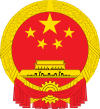
Heads of the People's Republic of China Common Program (1949–1954) Chairman of the Central People's Government: Mao Zedong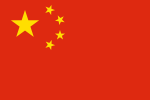
1954 Constitution (1954–1975) 1975 Constitution (1975–1978) 1978 Constitution (1978–1982) NPCSC Chairman: Ye Jianying · Song Qingling(honorary)1982 Constitution (1982–present) List of Presidents of the People's Republic of China Politics of the People's Republic of China Constitution of the People's Republic of China Parties State organs National People's Congress (Standing Committee · Chairman) · President (Vice President) · State Council (Premier · Vice Premier) · Central Military Commission (People's Liberation Army) · People's Political Consultative ConferencePolitics of
province-level
divisionsSee also: Elections Categories:- Lists of presidents
- Politics of the People's Republic of China
- Government of the People's Republic of China
- Presidents of the People's Republic of China
- China-related lists
- 1954 establishments
- 1975 disestablishments
- 1982 establishments
Wikimedia Foundation. 2010.

